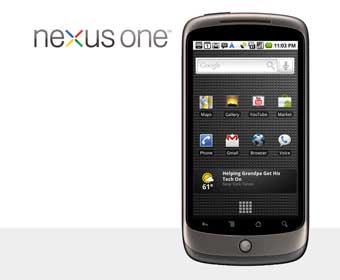The much discussed ‘Google phone’ is real, the web giant confirmed Tuesday, at the unveiling of the Nexus One - the first of many Google-branded mobile devices.
January 6, 2010

The much discussed ‘Google phone’ is real, the web giant confirmed Tuesday, at the unveiling of the Nexus One – the first of many Google-branded mobile devices.
Designed more as a showcase of what’s capable with the Android platform, the Google mobile devices will be built by hardware partners such as HTC and sold by Google itself with or without a service plan.
This is another interesting strand to the announcement – Google is also opening up a sales channel to sell these devices direct to consumers. The first such device is only available unlocked or on T-Mobile USA’s network at present, but the company promises to partner with more operators, including Verizon Wireless in the US and Vodafone in Europe in the future.
And what of the device itself? Manufactured by HTC, the Nexus One features a 3.7″ OLED display, five megapixel camera and a 1GHz Qualcomm Snapdragon chipset. It runs on Android 2.1, the newest version of Eclair, and boasts features like a voice-enabled keyboard allowing users to speak into any text field. It also comes with a host of popular Google applications, including Gmail, Google Voice and Google Maps Navigation.
On its own, the phone retails for $529, which drops to $179 with a T-Mobile USA Even More plan, which starts at $39.99 per month. But we’ve also noticed that the only place to buy the phone is via the Google store. You can’t purchase it via T-Mobile USA’s site. This is an interesting point and it’s one that John Delaney, research director at IDC, has picked up on too.
“So let’s say, at least, that this looks like the best Android phone to hit the market so far. That begs an important question: why would Google produce the market’s best Android phone, at the risk of annoying its licensees who are also producing branded Android phones? More generally, why is Google entering the phone business so directly at all?” Delaney said.
The analyst believes that Google sees phones as a means to an end. And that end is to build a large user base for Google’s mobile phone service properties; to expose that user base to advertising; and to collect the data its user base generates. “In other words, Google wants to be everyone’s starting point when they use the mobile internet,” Delaney said.
So, Google needs smartphones to steer their users towards Google’s packaged experience of mobile internet services – something the Android platform was designed to do. But this latest venture suggests that the other Android phones are not steering users effectively enough and Delaney reckons Android’s main licensees need Android enough to swallow whatever annoyance Google’s move into the driving seat might cause them.
The drawback in this instance is price however, $529 is not peanuts. For its plan to work Google needs to get as many of these devices into users’ hands as quickly as possible. So the forthcoming announcements from other operators such as Vodafone and Verizon will be key to the venture’s success.
About the Author(s)
You May Also Like








.png?width=300&auto=webp&quality=80&disable=upscale)


_1.jpg?width=300&auto=webp&quality=80&disable=upscale)


.png?width=800&auto=webp&quality=80&disable=upscale)